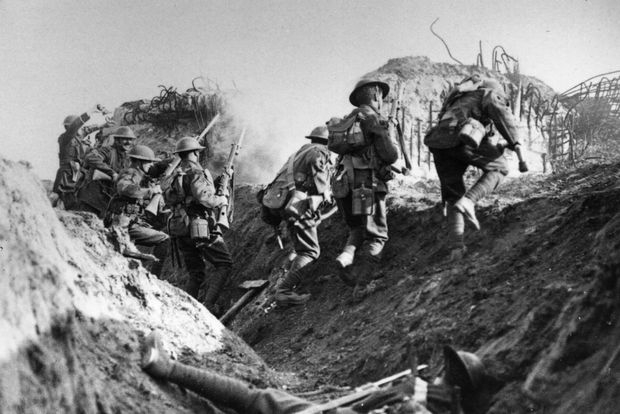From The Spectator, 10 October 1914:
AN old explanation of the phrase “at loggerheads”—whether true or not we do not attempt to say—runs as follows: When two armies met in what we should now call entrenched positions, those positions were spoken of as leaguers. The leaguers were pushed on, from both sides just as the trenches are now pushed on, till at last the ” leaguer-heads” were almost in contact, and were separated only by a hundred yards or so. The contending armies were then said to be at “leaguer-heads,” or “logger-heads.” They had reached the ultimate point, and could make faces or shout defiance at each other across the “bridge of war.” That is exactly what has happened on the Aisne, except just on the extreme north-western aide, where the line is still being prolonged. Elsewhere the combatants are at loggerheads. They are ” chock-a-block.” Neither side can advance further, except in a few special parts of the line, without incurring the tremendous losses involved in taking lines of trenches at the point of the bayonet…
Somebody will have to try to break through. Remember, it will seem more urgent to the Germans to do it than it will to our people, because, among other things, the Germans will be living in the enemy’s country and the Allies in their own. Again, the Germans, having time against them, and fearing the Russian advance, will be more urgent to get the thing over than we shall be. The position of temporary stalemate will suit us better than it will suit our enemies. We can afford to be unsuccessful and without victories, but they cannot. They have thrown down their last halfpenny already. We are only beginning to collect our resources for future use. The Indian troops only arrived last week. The Canadians only arrived three days ago. The Australians have not yet arrived. The main part of our Army has only just been recruited and is still in training. In three months’ time—and the stalemate may easily last longer than that—we shall have altogether two hundred thousand men from the oversea Dominions and from India, and the first five hundred thousand men of the new Army will present quite a creditable appearance and be clamouring to go to the front. The way in which the Germans have realized their resources and the courage with which they have put everything down on the table are magnificent, but that magnificence is now exhausted. We know the worst. If we may venture to say so without pride or boasting, the Germans do not know the worst that is being prepared for them either as regards Britain or as regards the Empire. We can still say with perfect truth: “There are plenty more where those came from.” That applies to men, to guns, to aeroplanes, and to ships.





Comments